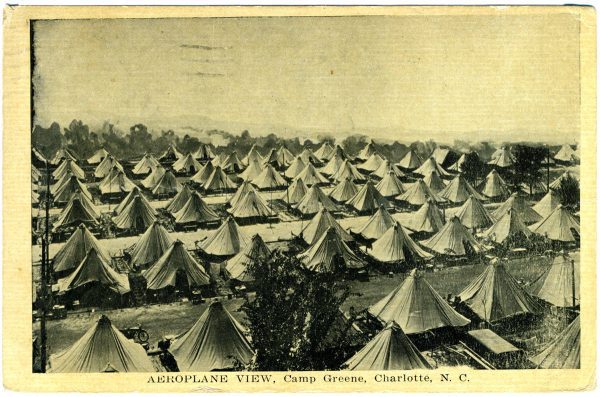History Professor, Students Partner With Community on Camp Greene Research

Few Charlotteans may realize that the Queen City housed a World War I training camp. Located just outside Uptown Charlotte, near Wilkinson Boulevard and Tuckaseegee Road, is Camp Greene. Opened originally in September 1917, Camp Greene was named for the Revolutionary War hero Nathanael Greene.
Associate Professor of History Heather Perry and her students are part of a University-community partnership to help history come alive. The World War I historian is assisting with the Historic WWI Camp Greene Centennial Festival, set for Saturday, July 15. WFAE has covered the camp and the festival extensively, including a Charlotte Talks session with Perry and other coverage.
Since 2014, many European cities have been commemorating the 100th anniversary of “The Great War” that lasted from 1914 to 1918. Yet, it was not until 1917 that President Woodrow Wilson asked Congress to declare war. Shortly thereafter, and for two years following, Camp Greene operated as one of 32 training camps throughout the United States, housing more than 60,000 soldiers.
The original 2,500-acre camp included a portion of a farm owned by the Dowd family. The historic Dowd House was the camp’s headquarters, and the home still remains.
Several years back, Perry was searching for local lore and happened upon a documentary showing of “City of Canvas: The Story of Camp Greene,” a labor of love from Charlotte historian Jack Dillard. Over the next several years, along with Dillard, the Charlotte Mecklenburg Library and the Charlotte Museum of History, Perry has helped bring Camp Greene to life for hundreds of people through presentations and teach-ins.
This all led to a phone call from Neal Broome, a local history buff. He has led efforts to celebrate and maintain the heritage of Camp Greene, including working closely with the Historic Camp Greene Neighborhood Association and the 2016 Camp Greene Festival. When the neighborhood association needed help, especially with historical research projects, Broome called Perry.
The history professor realized it was an opportunity to provide her students in the class “Intro to Historical Research” the chance to explore local World War I history. Research projects included “The Daily Life at Camp Greene,” “The Role of Charlotte’s Red Cross during the War,” “The Impact of the Great War on N.C. Tobacco Industries,” “N.C. Public Health and Education During the Spanish Flu Epidemic” and many others. Students presented their findings to the Camp Greene Neighborhood Association, and their projects will be on display during this year’s festival.
“It makes me cringe when people think the only thing to do with a history degree is teach,” Perry says. “This partnership allowed students to provide tangible value, and they experienced the real-world relevance of what they do. It really made history come alive for them and they’ve enhanced local historical knowledge.”
The Historic WWI Camp Greene Centennial Festival is a free event from 11 a.m. to 3 p.m., on Saturday, July 15. There will be dramatic reenactments, historic uniforms, scenes from the camp, tours of the General’s Quarters and the Dowd House, a screening of “City of Canvas: The Camp Greene Story,” plus a scavenger hunt for children. Local historians and scholars will have educational presentations and exhibits about the camp and how soldiers lived. Live music and food vendors will add to the celebration.
Words: Jenny Matz | Image: 1917-1918 postcard, Derwood Barbour Collection of North Carolina Postcards, publisher: A.M. Simon, New York, N.Y.